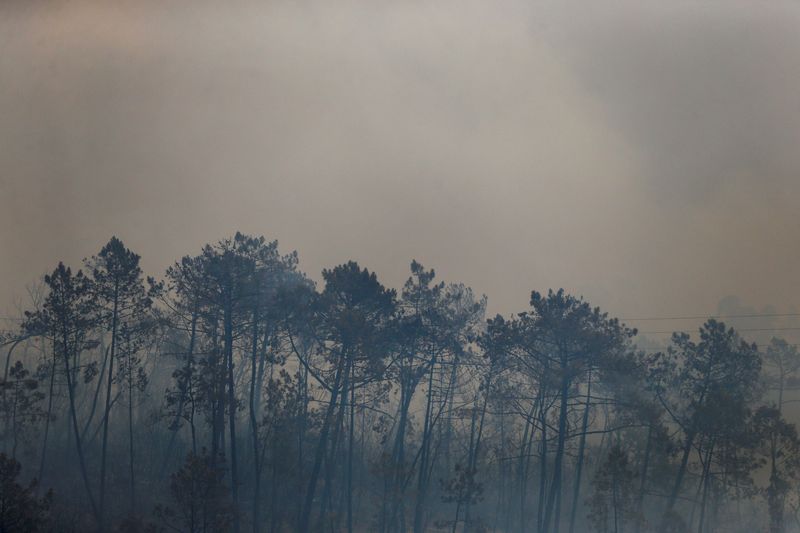BAKU (Reuters) - The COP29 climate talks in Azerbaijan aim to agree an annual finance target of $1 trillion or more a year to help poorer countries respond to global warming. Some see new taxes as one way to get there.
The Global Solidarity Levies Task Force (GSLT), led by France, Barbados and Kenya, is exploring the issue. Below are extracts from its latest report on the options being discussed and estimates about how much could be raised.
SHIPPING
The levy that could be closest to being agreed is for shipping, responsible for around 3% of global emissions, with governments set to debate a series of measures at a meeting of the International Maritime Organization in April.
Models for a levy include a Pacific islands and Caribbean proposal for a flat rate of $150/ton of carbon dioxide equivalent (CO2e), rising every five years, the GSLT said.
The European Union and Japan favour a levy of $100/ton in 2027, while countries including Bahamas and Liberia have proposed an initial flat rate of about $18.75/ton.
A levy of $150-300/ton could generate $127 billion a year in 2027-2030, the GSLT said, citing a study by U.N. Trade and Development. Revenue would fall to $103 billion in 2031-2040 and $36 billion in 2041-2050 as ships became less polluting.
AVIATION
Aviation accounts for 2% of global emissions yet is usually free of value-added tax (VAT) or sales taxes. Levies being discussed by the GSLT include kerosene fuel, private jet fuel, luxury tickets and frequent flyers, which together could generate $19 billion to $164 billion a year, it estimates.
Around 29 countries already tax aviation fuel through excise duties, carbon levies or emission permits. The average price among G20 countries in 2021 was 9 euros ($9.50) per ton.
Hurdles to a broader tax include ensuring a level playing field for industry players and overcoming legal barriers.
At least 21 countries also already have some form of levy on airline tickets, at rates ranging from 2 euros in Portugal to almost 500 euros on some flights out of Britain, the GSLT said.
FOSSIL FUELS
Countries already impose levies on fossil fuels, including indirectly when gasoline is bought at the pump, through VAT, carbon taxes or emissions-trading schemes, or via royalties or taxes on oil companies.
GSLT said revenues could be generated in future through a levy on extraction or "windfall" taxes on energy company profits.
A "Climate Damages Tax" of $5/ton extracted in 2024 would generate an estimated $216 billion, a Greenpeace report this year said.
An ActionAid report said a 50% tax on the windfall profits of the biggest 14 fossil fuel companies by market value in the two years to July 2023 would have generated around $173 billion.
FINANCIAL TRANSACTIONS
More than 30 countries have some form of levy on financial transactions including Britain, France, Italy and Spain although agreeing a cross-border levy has proved tough.
The Austrian Institute of Economic Research estimates a 0.1% levy on trading stocks and bonds and a 0.01% rate on derivatives trades globally could raise $238 billion to $419 billion a year.
CARBON
The GSLT says there are currently 75 carbon pricing mechanisms across 83 jurisdictions, of which 36 are structured as emissions trading systems (ETS) and 39 as carbon taxes. In total, they cover 24% of global emissions.
But most are priced more cheaply than the $40-$80 a ton needed to keep the world on track to rein in global warming, due to political concern about the impact on households and businesses.
A plan proposed by the International Monetary Fund would see countries agree a minimum price of $50 a ton, or of $25, $50 and $75 a ton varying with the stage of a country's development.
The GSLT said another option could be to link up existing trading schemes.
WEALTH
The Group of 20 largest economies this year discussed whether to raise taxes on the super-rich.
A report backed by current G20 leader Brazil proposed a global minimum tax of 2% of wealth for the world's roughly 3,000 dollar-billionaires, to raise about $250 billion a year.
Other options could include changing the threshold at which the tax kicks in and the rate at which it is applied.
CRYPTO
Cryptocurrencies such as bitcoin are created by computation power driven by energy usage that creates emissions.
In 2022, Kazakhstan moved to charge crypto miners between 1 and 25 Tenge ($0.002-0.056) per kilowatt-hour, the GSLT said. A global tax on electricity use of $0.045 per kWh could raise $5.2 billion, the IMF has estimated.
A levy on crypto trading at 0.1% could raise $15.8 billion while a capital gains tax of 20% could raise up to $323 billion, IMF research shows.
PLASTICS
Countries are set to meet in South Korea next week to agree a deal on reining in plastics pollution, with Ghana and others calling for a levy on producers of virgin plastic polymers.

A fee of $60-90 per tonne on primary polymer production could raise $25-35 billion a year, the GSLT said, citing analysis from Australian non-profit the Minderoo Foundation.
($1 = 0.9473 euros)